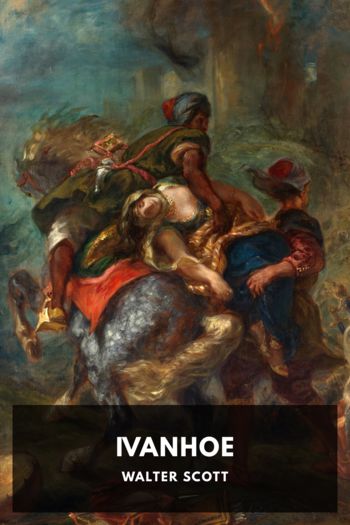Ivanhoe - Walter Scott (bookreader txt) 📗

- Author: Walter Scott
Book online «Ivanhoe - Walter Scott (bookreader txt) 📗». Author Walter Scott
“Holy father,” said the knight, “upon whose countenance it hath pleased Heaven to work such a miracle, permit a sinful layman to crave thy name?”
“Thou mayst call me,” answered the hermit, “the Clerk of Copmanhurst, for so I am termed in these parts—They add, it is true, the epithet holy, but I stand not upon that, as being unworthy of such addition.—And now, valiant knight, may I pray ye for the name of my honourable guest?”
“Truly,” said the knight, “Holy Clerk of Copmanhurst, men call me in these parts the Black Knight—many, sir, add to it the epithet of Sluggard, whereby I am no way ambitious to be distinguished.”
The hermit could scarcely forbear from smiling at his guest’s reply.
“I see,” said he, “Sir Sluggish Knight, that thou art a man of prudence and of counsel; and moreover, I see that my poor monastic fare likes thee not, accustomed, perhaps, as thou hast been, to the license of courts and of camps, and the luxuries of cities; and now I bethink me, Sir Sluggard, that when the charitable keeper of this forest-walk left those dogs for my protection, and also those bundles of forage, he left me also some food, which, being unfit for my use, the very recollection of it had escaped me amid my more weighty meditations.”
“I dare be sworn he did so,” said the knight; “I was convinced that there was better food in the cell, Holy Clerk, since you first doffed your cowl.—Your keeper is ever a jovial fellow; and none who beheld thy grinders contending with these peas, and thy throat flooded with this ungenial element, could see thee doomed to such horse-provender and horse-beverage,” (pointing to the provisions upon the table,) “and refrain from mending thy cheer. Let us see the keeper’s bounty, therefore, without delay.”
The hermit cast a wistful look upon the knight, in which there was a sort of comic expression of hesitation, as if uncertain how far he should act prudently in trusting his guest. There was, however, as much of bold frankness in the knight’s countenance as was possible to be expressed by features. His smile, too, had something in it irresistibly comic, and gave an assurance of faith and loyalty, with which his host could not refrain from sympathizing.
After exchanging a mute glance or two, the hermit went to the further side of the hut, and opened a hutch, which was concealed with great care and some ingenuity. Out of the recesses of a dark closet, into which this aperture gave admittance, he brought a large pasty, baked in a pewter platter of unusual dimensions. This mighty dish he placed before his guest, who, using his poniard to cut it open, lost no time in making himself acquainted with its contents.
“How long is it since the good keeper has been here?” said the knight to his host, after having swallowed several hasty morsels of this reinforcement to the hermit’s good cheer.
“About two months,” answered the father hastily.
“By the true Lord,” answered the knight, “everything in your hermitage is miraculous, Holy Clerk! for I would have been sworn that the fat buck which furnished this venison had been running on foot within the week.”
The hermit was somewhat discountenanced by this observation; and, moreover, he made but a poor figure while gazing on the diminution of the pasty, on which his guest was making desperate inroads; a warfare in which his previous profession of abstinence left him no pretext for joining.
“I have been in Palestine, Sir Clerk,” said the knight, stopping short of a sudden, “and I bethink me it is a custom there that every host who entertains a guest shall assure him of the wholesomeness of his food, by partaking of it along with him. Far be it from me to suspect so holy a man of aught inhospitable; nevertheless I will be highly bound to you would you comply with this Eastern custom.”
“To ease your unnecessary scruples, Sir Knight, I will for once depart from my rule,” replied the hermit. And as there were no forks in those days, his clutches were instantly in the bowels of the pasty.
The ice of ceremony being once broken, it seemed matter of rivalry between the guest and the entertainer which should display the best appetite; and although the former had probably fasted longest, yet the hermit fairly surpassed him.
“Holy Clerk,” said the knight, when his hunger was appeased, “I would gage my good horse yonder against a zecchin, that that same honest keeper to whom we are obliged for the venison has left thee a stoup of wine, or a runlet of canary, or some such trifle, by way of ally to this noble pasty. This would be a circumstance, doubtless, totally unworthy to dwell in the memory of so rigid an anchorite; yet, I think, were you to search yonder crypt once more, you would find that I am right in my conjecture.”
The hermit only replied by a grin; and returning to the hutch, he produced a leathern bottle, which might contain about four quarts. He also brought forth two large drinking cups, made out of the horn of the urus, and hooped with silver. Having made this goodly provision for washing down the supper, he seemed to think no farther ceremonious scruple necessary on his part; but filling both cups, and saying, in the Saxon fashion, “Waes hael, Sir Sluggish Knight!” he emptied his own at a draught.
“Drink hael, Holy Clerk of Copmanhurst!” answered the warrior, and did his host reason in a similar brimmer.
“Holy Clerk,” said the stranger, after the first cup was thus swallowed, “I cannot but marvel that a man possessed of such thews and sinews as thine,





Comments (0)